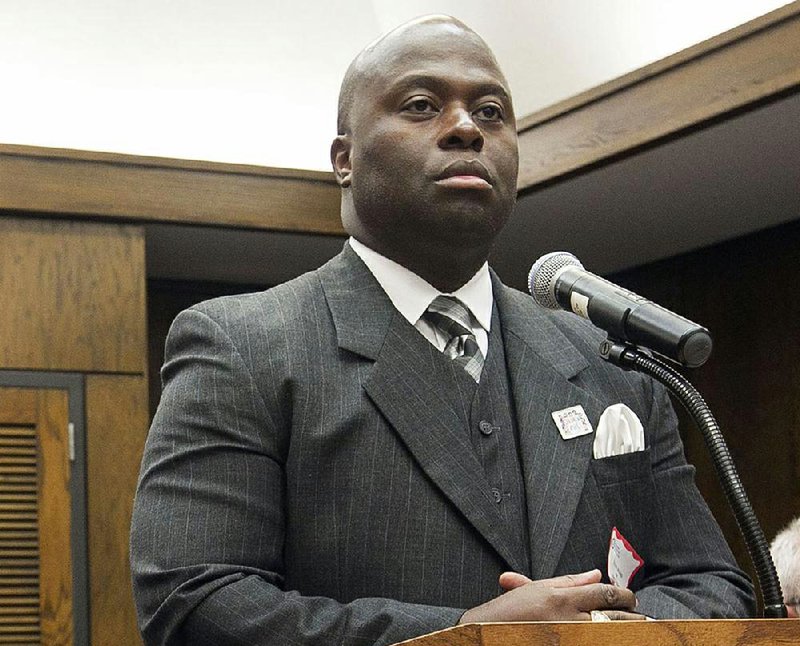The doctoral degree of a former Little Rock School District superintendent has been revoked by an Indiana university, meaning the district is no longer obligated to continue making payments on a nearly $250,000 settlement with him.
Dexter Suggs, who resigned as superintendent of the state's largest school district in April, had his doctorate from Indiana Wesleyan University nullified in August, said Don Sprowl, executive vice president of academic affairs at the university.
"He no longer holds the degree he once held," Sprowl said Monday.
Sprowl confirmed Suggs' degree was a doctorate of education in organizational leadership, originally granted in December 2009. Suggs still holds a master's degree and an education specialist degree from the university.
Suggs resigned from the Little Rock superintendent's job April 20 after allegations arose that he plagiarized parts of his doctoral thesis at the university.
A settlement and severance agreement between Suggs and Arkansas Education Commissioner Johnny Key provided $50,500 payments to Suggs every two months -- on July 1, Sept. 1, Nov. 1 and Jan. 1, 2016 -- from Little Rock School District funds.
Within 10 days of his resignation, Suggs also received $41,708.50 in salary and $4,500 for transition expenses as part of the settlement.
But the agreement stipulated that if Suggs' doctoral degree was "revoked, rescinded or otherwise nullified, employer will have no obligation to pay any unpaid amounts" otherwise due to Suggs.
Suggs' Arkansas cellphone number has been disconnected, and an Indiana cellphone number he previously used has since been reassigned.
The news of the degree revocation was first reported Monday by radio station KUAR-FM, 89.1.
According to a Little Rock School District statement released Monday afternoon, the payment due July 1 was made in a "timely manner," but the district "is not obligated to make any further payments to Suggs."
Key was prepared for a "contingency such as this," the Arkansas Department of Education said in a Monday statement.
"The separation agreement outlines the consequences to Suggs in the event his degree was revoked," the statement said. "With that issue now closed, the commissioner is eager to assist [the Little Rock School District] in its ongoing process of improvement."
The Arkansas Board of Education voted 5-4 on Jan. 28 to take control of the 24,000-student Little Rock School District, changing Suggs' title to interim superintendent. The district's seven-member locally elected School Board was dismissed as part of the takeover.
The state acquisition of the 48-school district was primarily tied to six schools labeled by the state Education Department as academically distressed. The six schools -- Baseline Elementary, Cloverdale and Henderson middle schools; and J.A. Fair, Hall and McCellan high schools -- had fewer than half of their students scoring at proficient levels on state math and literacy exams over a three-year period.
The Little Rock School Board hired Suggs as superintendent in March 2013, and he officially began work on July 1 of that year. He was formerly chief of staff in the Indianapolis public schools.
Suggs was given a 1 percent pay increase and his contract extended by a year in September 2014. He was being paid $202,000 on a contract set to expire June 30, 2017.
After Suggs' departure, Key appointed attorney, businessman and former Little Rock School Board member Baker Kurrus to the superintendent's job in May. Kurrus is paid an annual salary of $150,00 and reports to Key.
Little Rock attorney Matt Campbell, author of the Blue Hog Report blog, first publicly accused Suggs of plagiarizing parts of his 2009 doctoral dissertation.
Campbell identified parts of the dissertation that were identical or nearly identical to passages in other, earlier writings by others not listed in the dissertation's 12-page reference section.
Suggs said at the time that "everything was above board" in his doctoral studies and he did not feel as if he "intentionally committed any fraud or plagiarism."
Sprowl said that in "cases of alleged academic misconduct discovered after degree conferral," a faculty review panel is convened and gathers and hears evidence in the matter. The graduate is afforded due process during the case.
"The faculty review panel then makes a recommendation to the president, and the president makes a final decision if there is a recommendation for sanctions of some sort," Sprowl said.
There is also an appeal process before the president makes a final decision.
Sprowl said that he couldn't comment on whether Suggs appealed the decision.
Information for this article was contributed by Cynthia Howell of the Arkansas Democrat-Gazette.
State Desk on 09/01/2015
